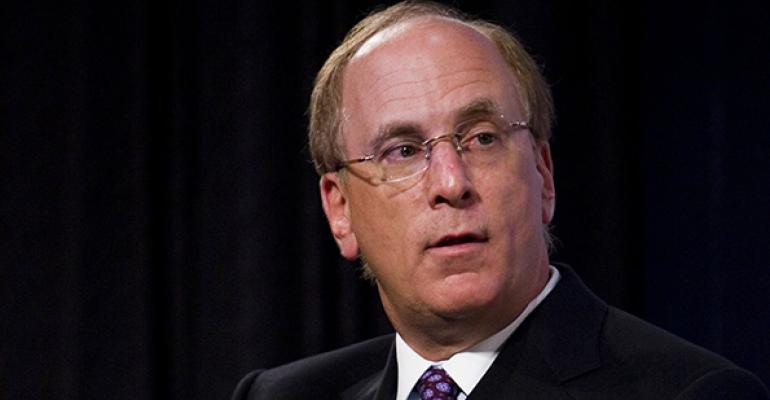By Sabrina Willmer
(Bloomberg) --BlackRock Inc. crossed the $6 trillion asset mark and is already seeing benefits from the new U.S. tax law.
The world’s largest asset manager hit $6.3 trillion in the fourth quarter and said net income was bolstered by $1.2 billion related to the tax legislation as well as flows into exchange-traded funds last year. The New York-based company’s Chief Executive Officer Laurence D. Fink said in a statement Friday that BlackRock had the strongest net flows in its history last year -- $367 billion.
The stimulus created by the tax reform is likely to drive more money into investment products and push stock and bond prices even higher. Fink said in an interview with Bloomberg that the tax law will give clients more cash flow, which can be used for making investments.
“We’re seeing clients continuing to put money to work,” he said. “I expect that to continue.”

BlackRock’s effective tax rate will fall to 23 percent from about 31 percent, Fink said. That will likely boost the firm’s profitability 6 percent to 7 percent this year, said Kyle Sanders, an analyst at Edward Jones & Co.
“The impact of the tax law is significantly positive, especially for traditional asset managers,” said Arjun Saxena, asset and wealth management tax reform platform leader at PricewaterhouseCoopers. “You can expect GDP growth to perk up, which will flow into asset values and higher savings.”
Fink told CNBC Friday that overall the tax law "is going to do wonderful things, especially for small businesses." He said he was still unhappy with certain aspects. "They should have totally eliminated carried interest," he said.
Fink said in October that the tax plan would greatly expand deficits if it wasn’t changed. He opposed eliminating the state and local tax deduction and called for a corporate tax rate between 25 percent and 27 percent. The new law puts a $10,000 limit on state and local deductions and reduces the corporate rate to 21 percent from 35 percent.
Another provision in the legislation could help drive more flows into investment products offered by asset managers, especially mutual funds, according to Saxena. The law repeals the deductibility of investment advisory fees and could be a blow to wealth managers, he said. The change means an investor could see an after-tax benefit from investing directly in a mutual fund rather than paying fees to a wealth manager, which typically invests in passive products.
“There could be a shift in leverage of bargaining power between wealth managers and asset managers,” said Saxena.
The law is also expected to drive growth of 529 savings plans, which will move more money into mutual funds and index offerings, said Saxena. It allows for distributions from those accounts also to be used to pay for some K-12 school expenses.
BlackRock increased its dividend and reported adjusted earnings per share that beat analysts’ estimates.
--With assistance from Brandon Kochkodin.To contact the reporter on this story: Sabrina Willmer in Boston at [email protected] To contact the editors responsible for this story: Margaret Collins at [email protected] Alan Mirabella





